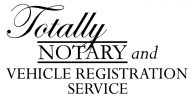The DS-3053 is a federal form issued by the U.S. Department of State. It allows an absent parent to give permission for the issuance of a U.S. Passport to their child when he/she cannot be present at the passport application appointment.
It requires notarization. Many CA notaries, ignorant of our notary laws, simply stamp and sign the form, unaware that they are violating the law.
As a federal form, the DS-3053 presents some issues for the California notary.
First, it does not contain a notary certificate. In CA, if a document requires notarization and does not include an acknowledgment or jurat certificate, the notary must either attach the appropriate loose certificate or if room allows, stamp the prescribed verbiage on the form.
Per the 2023 Notary Public Handbook and confirmed by the CA Secretary of State’s office:
“California law requires specific language when a seal is attached to a notarial act (Civil Code § § 1189, 1195; Government Code § 8202). The wording on form DS-3053 does not meet the requirements of California and therefore a California notary public may not affix their seal on the federal form. Additionally, it is stated in the Notary Public Handbook, published by the California Secretary of State, …”a notary public seal and signature cannot be affixed to a document without the correct notarial wording.”
The DS-3053 does not contain any space to stamp the notarial verbiage, so a loose certificate must be attached.
The second issue is determining which certificate to attach. By law, the notary is prohibited from choosing the notarial act to be performed by the signer. We are to ask the signer what type of notarization they would like, and if they don’t know, the document originator is supposed to supply guidance. Reaching the U.S. Department of State regarding document guidance might present some challenges, so it is fortunate for the notary that the document itself provides some guidance. It requires the parent/guardian to make the oath that the contents of the document are truthful:
“OATH: I declare under penalty of perjury that all the statements made in this supporting document are true and correct.”
While the document itself does not contain a notarial certificate, it does requires the parent to affirm under penalty of perjury the contents are correct, which would indicate the appropriate certificate would be a Jurat.
Per a NNA article from 2015: “…the California Secretary of State’s office has confirmed that California notaries may not complete a Form DS-3053 without attaching a California Jurat form.”
Steps for the CA notary to notarize the DS-3053 according to California law:
- Verify that the signer has completed Sections 1-5.
- Administer the Oath by asking the signer, “Do you declare under penalty of perjury that the statements made in this supporting document are true and correct?”
- Once they have verbally confirmed, have the signer sign and date the form.
Section 6 is completed by the notary, but it should not be signed by the notary:
- Notary name
- City and State location
- Commission expiration date
- Check off which identification the signer presented.
- Enter the ID number
- Place of issue
- Issue date
- Expiration date
- Date of notarization
- Signature of Notary – Do Not Sign
It is recommended to stamp or print the words, “See CA Jurat Attached” on the notary signature line before attaching the CA Jurat certificate.
Note: It is also helpful to remind the signer that a photocopy of the ID they presented (front and back side) must be attached to the notarized form before it is submitted for review at the passport office.
©2023 Totally Notary All Rights Reserved


Hi, Thank you for your posting this article. It’s exactly what I was looking for.
The one thing that I’d probably add to it, is where you list the items to complete for Section 6. I would emphasize to make sure not to stamp the seal either per the following excerpt from the California 2023 Notary Public Handbook, Page 12 “Also, a notary public seal and signature cannot be affixed to a document without the correct notarial wording.”
Thank you!
I’m glad you found it helpful.